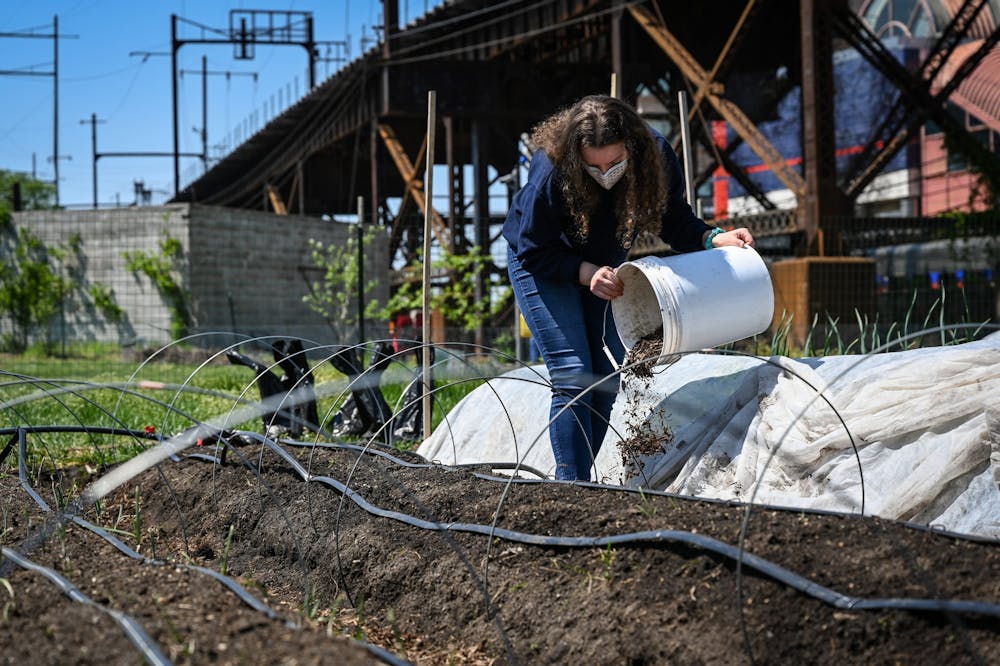Penn is on track to meet the sustainability goals that it outlined in 2019 as it prepares for the fourth iteration of its climate action plan.
On Jan. 23, Penn Sustainability published its annual progress report on the Climate and Sustainability Action Plan 3.0 for the fiscal year 2022. The report — based on data from the previous year — highlighted achievements and areas of progress toward the goals outlined in the University's five-year plan. It follows a renewed campaign by student activists last fall for broader action on climate, including full divestment from fossil fuels.
Among other findings, the report said that the main campus’ carbon footprint decreased by 45% from 2009 to 2022 — a marginal improvement from 2021’s decrease of 44.3% since 2009. This constituted a smaller change than 2021’s report, which reported a 7.1% reduction in emissions from 2020. However, it marks progress toward the University's goal of being 100% carbon neutral by 2042.
Nina Morris, the sustainability director of Penn Sustainability, told The Daily Pennsylvanian that the report demonstrates progress towards meeting its goals for 2024, the final year outlined by CSAP 3.0.
"Right now, we're working really hard to ensure that all the goals and strategies are wrapped up and we'll be able to provide, hopefully, by next year, a full picture of the progress made and examples of how each of the goals were met," Morris said.
The University anticipates that its carbon footprint will continue to drop once two solar fields come online in 2024, Morris said. The dual solar energy facilities, which are being built in central Pennsylvania, were announced in 2020 when Penn signed the Power Purchase Agreement. The agreement is designed to offset 70% of electricity use by the academic campus and health system.
Other objectives that Penn Sustainability provided updates on in the report include the University's academic initiative, with 4,695 students enrolled in sustainability-related courses during the 2021-22 academic year. The report also underlined the creation of a carbon footprint for Penn’s real estate portfolio, as well as a waste precinct map with Urban Park and Penn Housekeeping that is designed to collect data and identify opportunities for "increased diversion."
While the University pursues its sustainability plan, student activists involved with Fossil Free Penn praised some aspects of the latest report but said that Penn should take faster and wider-ranging actions.
RELATED:
FFP protestors suspended from Penn Band, allege University involvement in discipline
Penn announces it no longer holds direct investments in fossil fuel companies
College junior Katie Francis, a coordinator with FFP, said that although the climate change efforts were positive, progress is not being made fast enough. Francis reiterated FFP's demand that the University fully divest, dissociate, and cut "all ties" with fossil fuel companies.
"These companies still come to career fairs here on campus and recruit Penn students to work for them," Francis added.
In November, Penn announced that it no longer holds direct investments in fossil fuels. The University also does not hold investments in 200 companies whose reserves contain the largest amount of potential carbon emissions.
“I think I speak for most of [FFP] when I say that we all know that Penn uses greenwashing tactics in order to avoid the responsibility of having to address climate change issues,” Francis said.
College sophomore Eug Xu, another organizer with FFP, said that Penn's goals outlined in the utility and operations section of the report are “fairly good in terms of concrete reductions in emissions and electrical demands of the university.”
However, too much of the sustainability plan is vague and focused on gathering information rather than taking action, Xu said. They said that the University's report on Scope 3 emissions — intended to quantify emissions from goods and services purchased by Penn — required concrete action rather than presenting information.
"Penn has a much larger, and more broad-reaching impact than the acute campus that they sit on. They have a global impact based on being an Ivy League university,” Xu added. “I think the university should be thinking bigger and doing bigger than just our campus.”
According to the report, Penn Sustainability will spend the next two years finalizing the goals outlined in CSAP 3.0 "and preparing for the next phase of planning."
Morris encouraged students to participate in the work of her office and sustainability more broadly. She added that students could expect "a lot more" from the office regarding sustainability events focused on how to reduce waste "from the beginning."
“We want to find as many ways as possible to support and engage with our school community in whatever way that we can," Morris said.









